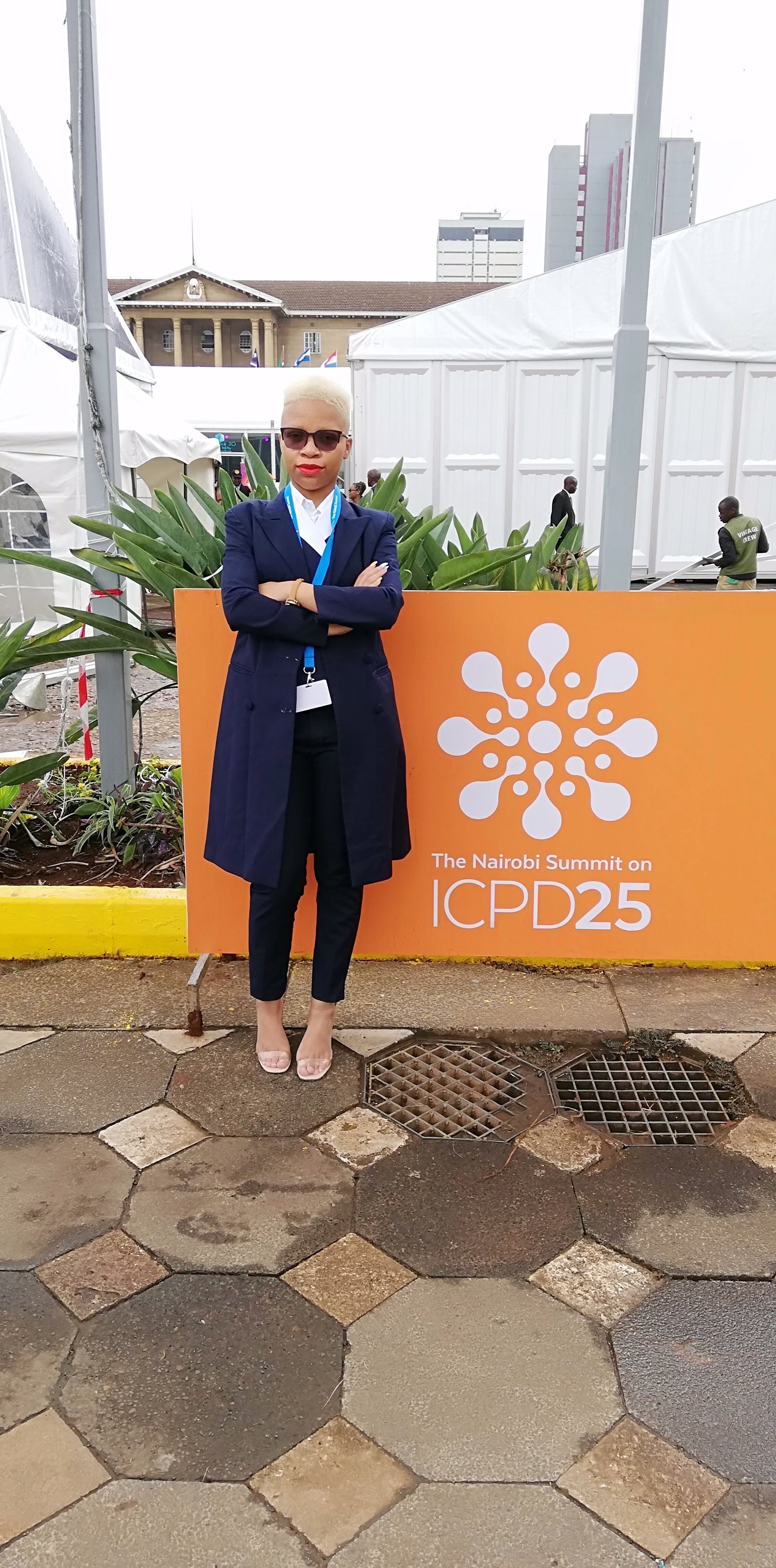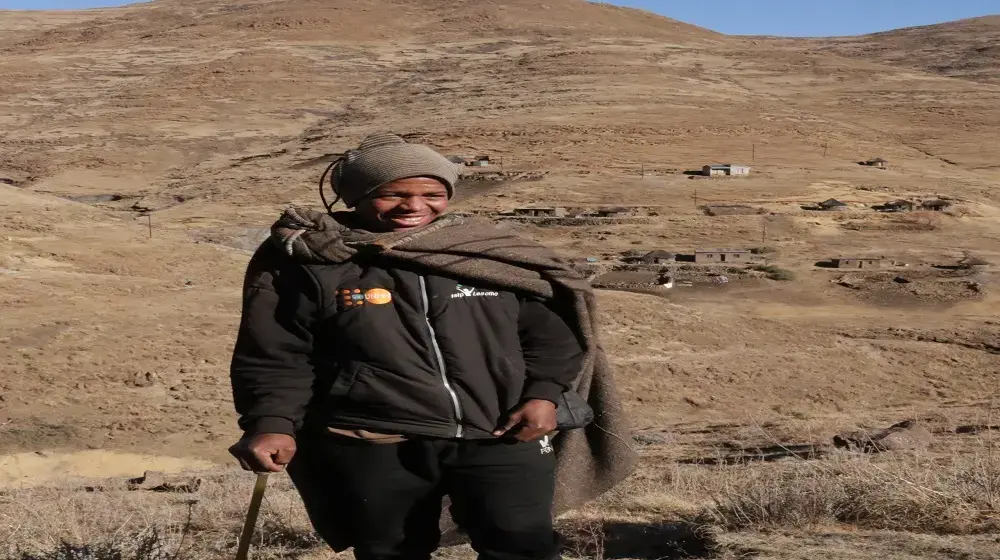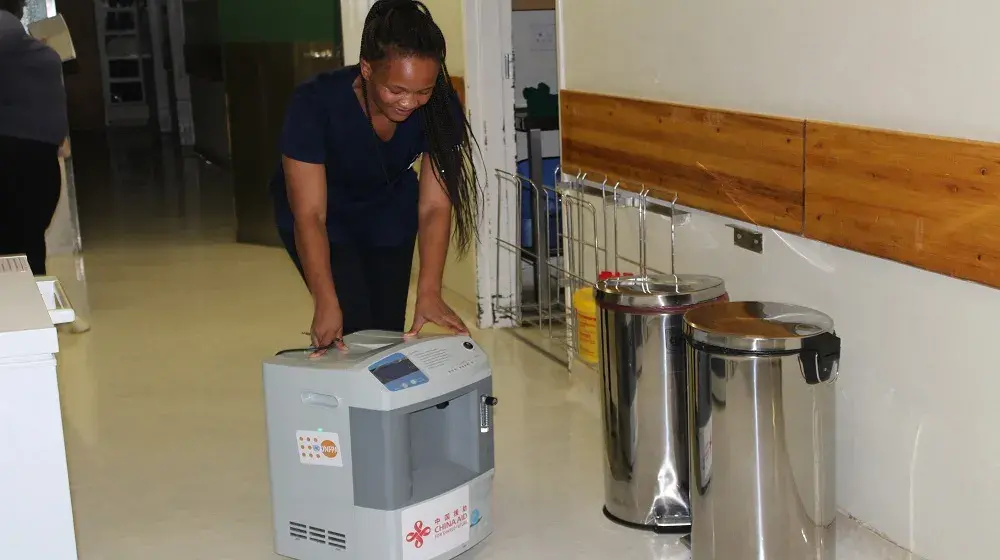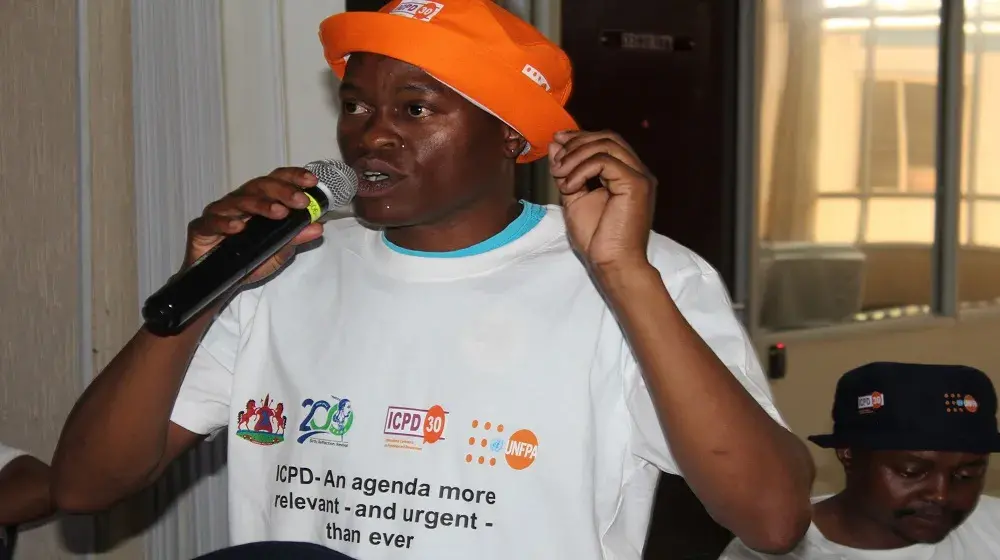For someone who due to lack of finances interrupted her education to become a child-minder for one year before she could go back to further her education., Mamello Makhele, has done well for herself. She is now not only a registered Nurse and Midwife, but also a SheDecides leader in Lesotho and a SAFAIDS Youth Advocacy and Accountability member. She comments,
“I have learnt that sometimes before you can be what God intends you to be, you first have to walk through fire to prepare you to become the best version of yourself, Sometimes the bad things that happen in our lives put us directly on the path to the most wonderful things that will ever happen to us. I grew up in an environment where death no longer scared me. I lost my uncles and aunts before I could get to class seven. Life in poverty was hard and it meant shaking you out of your comfort zone.”
Mamello is dedicated to improving health-care service delivery in the rural areas of Lesotho, wherein high maternal mortality rate is aggravated by among others, early and forced marriages. She left her job at the biggest hospital in the country to join a community clinic where she believes her impact can be the greatest. Her passion for improving the health-care system and empowering young women to take control of their health led her to start an “adolescent corner”, which she has incorporated into the clinic facility.
As a SheDecides movement leader in Lesotho, Mamello contributes towards the development and the inclusivity of the Southern Africa Development Community (SADC) score - card on sexual and reproductive health rights (SRHR). SheDecides is a global political movement that creates a world where every girl or woman has the responsibility to decide what to do with her body, her life and her future without question. In 2017, the former President of the United States Donald Trump introduced the global gag rule which denies foreign organizations receiving US family planning assistance the right to use their own non-US funds to support legal abortion or advocate for legalizing abortion in their countries. SheDecides was then established as a movement to promote women’s rights following the global gag rule.
In appreciation of her SheDecides leadership role Mamello says,

“Being selected as a SheDecides leader is one of my greatest achievements because I was capacitated with knowledge and skills about SRHR. Through SheDecides, I had an opportunity to represent Lesotho on maternal health on different international platforms, build sustainable partnerships and networks. Without SheDecides I wouldn’t have secured recognition in International Organizations like UNFPA, the United Nations Population Fund, in which I participate as one of the panellists in their campaigns. I wouldn’t have been selected to become a Mandela Washington Fellow. Most importantly, SheDecide has given me the platform to advance my advocacy campaigns,” she states.
As a member of SAFAIDS Youth Advocacy and Accountability, Mamello advocates for up-scaling of prevention of unintended pregnancies and unsafe abortions among sexually active adolescents. She is also a gender and maternal health advocate who has represented Lesotho on various international platforms, including the International Conference on Population and Development (ICPD25) held in Kenya in 2019.
Ms Makhele’s view on Sexual Reproductive Health and Rights (SRHR) is that “SRHR means having the power to access quality comprehensive services and the ability to exercise bodily autonomy. She is however, troubled that to date women in Lesotho are denied safe abortion unless it is on medical grounds . She says her other concern is prevalence of child marriages yet the country has ratified most of the international frameworks to eradicate such harmful practices. According to Mamello these practices are driven by institutionalised patriarchy and toxic masculinity. The propensities infringe on the power of women to make decisions about among others, health care, contraceptive use, sex and even the right to state what they want and need in relationships. Rooted in these tendencies is perpetuation of a regrettable perception of women owned by men with no respect for their rights and independence.
“In Lesotho young girls can even married off to older men increasing their chances of contracting HIV and other STIs. One of the most detrimental consequence of child marriage is maternal and infant morbidity and mortality. To this, adolescents in particular face higher rates of complications during pregnancy and childbirth.”
In addition, Mamello perceives the unequal gender relations and cultural norms in the Basotho society as leading to power imbalances in relationships between the sexes; thus restricting the capacity of women to make decisions about their bodies. Often women do not have the right to decide on whether or not and when to use contraception as they cannot initiate conversation with their partners on this matter for fear of being perceived of infidelity or other misconceptions about contraceptives, leading to violence in some instances. The inability by some women to access contraceptives has led to increase in unplanned pregnancies and unsafe abortions. Substantiating this position Mamello remarks that,
“The inability to own my body and have autonomy is also contributing to the high rise in early and unintended pregnancies- a situation that denies an adolescent girl or a young woman prosperity in life. In the long run dropping out of school early due to pregnancy increases the disparities between boys and girls and men and women. When one is not educated, they do not have necessary skills to compete on the job market hence worsening the poverty situations that could be prevailing. Sexual assaults, rapes, sexual and related harassment and rape that as young people we experience within our society are eminent examples of a society that does not respect bodily autonomy. When humanitarian situations arise like in this era of COVID 19, ill treatment of women is worsened including sexual exploitation and abuse that do not respect the rights/choices of young girls and young women ”
Mamello cautions the Government that access to quality health services is the fundamental right of women and men She notes with concern that in the remote areas, women especially still have to walk for hours to access modern contraception as a health service. She remarks that if the Government is to achieve zero unmet need for family planning, then sustainable programs in these areas must be established
She observes that although the country has made strides in implementing Comprehensive Sexuality Education (CSE), inaccessibility to electricity for many schools in hard- to- reach areas gravely impinges on the young people’s right to education and information. These youth then remain subjected to teenage pregnancies and forced and early marriages..
Mamello further observes that with the advent of Covid -19 pandemic, has been alarming escalation of teenage pregnancies, child marriages, new HIV infections, violence against women. escalated. . This indicates how fragile our systems are. In such times of crisis women and girls face a disproportionate risk to their dignity, health and body. Women’s right to choose must be recognised as key to creating a better, stronger and safer environment to live in. That is why women’s right to decide must be at the heart of the national efforts to Covid 19 response and all pandemics that threaten her rights. She notes these efforts by the Government of Lesotho in response to the virus does not weaken efforts to create a world where women can exercise bodily autonomy. Mamello’s voice best captures her sentiments thus,
“Integrated sexual and reproductive health services covering contraceptives, HIV, pregnancy, abortion, infertility, STI, cancers and violence that protect her right to decide must be recognized as essential services. Funding that advances and defends her right to decide must be prioritized and protected.”
About women in Lesotho still dying while giving birth, Mamello ’s view is that women in rural areas still die due to obstetrical complications. Even now some of them have to ride on horseback for hours to get to the nearest health facility. Mamello’s voice captures not only her recollection of the Government’s responsive effort to the health needs of pregnant women from remote areas, but also her disappointment with the whole situation.
“The Government of Lesotho, she says,” had established shelters in health facilities to allow for women from remote areas to stay in until delivery but these are still not fully utilized. The factors contributing to maternal deaths are unsafe abortions, teenage pregnancies and other obstetrical complications. My recommendations would be for the Government to adequately equip health facilities in remote areas with human resource capacity and equipment to provide the best quality to the pregnant mothers. Moreover, the Government should facilitate for establishment of sustainable partnerships with community movement to advocate for eradication of child marriages particularly in remote areas as well as harmonising the age of consent to marriages, and most importantly, legal abortion in Lesotho. Although it is illegal, women each day continue to resorting to backstreet termination of pregnancy which contributes to maternal deaths“.
Mamello’s biggest epiphany is being selected as a SheDecides leader.She says,
“It is one of my greatest achievements because I was capacitated with knowledge and skills about SRHR. Through SheDecides, I had an opportunity to represent Lesotho on maternal health on different international platforms and build sustainable partnerships and networks. Without SheDecides I wouldn’t have linked up International Organizations like UNFPA, and participating in their campaigns as one of the panelists. I wouldn’t have been selected to become a Mandela Washington Fellow. Most importantly, this opportunity /UNFPA has given me the platform to advance my advocacy campaigns.” She continues to narrate that,
“In June 2021, I was selected among hundreds of applicants as a top 5 delegate speaker for One Young World Summit held in Germany. Recently, I received an email from Gates Ventures in Washington to celebrate my work as one of the African Heroes in Global Health, education and development. I am reminded that it doesn’t matter how poor you are but hard work, passion and consistency will lead you to places you have never imagined to be.”
Talking about her biggest challenge in life, Mamello narrates,
“When I was 15, my mother was brutally murdered in cold blood, and to date no justice has been served. For most of my years, I grew up hating men. When I joined SheDecides I realized that my mother’s story is not a unique one. It reflects stories of many women who are subjected to gender- based violence. My pain and anger have motivated me to become an advocate. The best revenge is for me to be the voice of the voiceless. While I may not change the system at once, but the lives that I continuously impact is a win for me. “
Mamello’s message to women in Lesotho is ‘Be that woman who wakes up with purpose and intent. Be that woman who shows up and never gives up despite life hurdles. Every day, visualize your highest self then start showing up as her
In the next ten years of her life, she envisions herself as a maternal health and child expert influencing policies that defend her right as a woman to decide. Most importantly, she wants to have sustainable community programs within the remote areas in Lesotho where young people in these places can have informal education on SRHR to enable them to make informed choices.
Best memory from childhood?
Her best childhood memory was when her grandmother bought her gifts after she had passed SStandard Seven with first class. “I grew up in an extended family raised by my grandparents. I was the first grandchild to have ever passed standard Seven with first class and for my grandmother to actually compromise to buy me gifts was overwhelming.” She says.
In her spare time, Mamello loves to read on how countries are incorporating technology to advance women’s reproductive health. “There is too much to do in terms of achieving gender equality and each day I wake up to learn something new that would help me advance women’s rights in Lesotho,”





